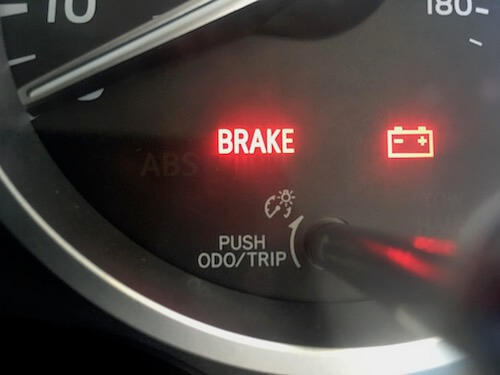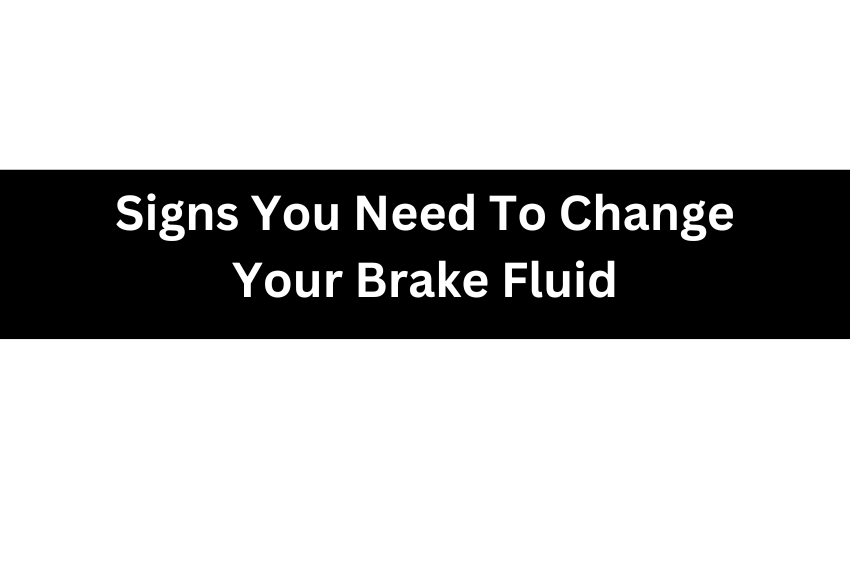Are you noticing your brakes feeling spongy or making strange noises?
These could be signs that your brake fluid needs to be changed.
In this guide, we’ll discuss some of the signs you need to change your brake fluid.
What Are The Signs That My Brake Fluid Needs To Be Changed?
Spongy Or Soft Brake Pedal

One of the signs that your brake fluid needs to be changed is when your brake pedal feels squishy or doesn’t feel as firm as it used to.
One common reason for this is that there might not be enough brake fluid in your car.
Brake fluid helps your brakes work properly, and if there’s not enough, your brakes may not stop your car as quickly as they should.
Another thing that can make your brake pedal feel spongy is there’s air in your brake lines.
Brake lines are like tubes that carry brake fluid to your brakes.
If there’s air in these tubes, it can make your brake pedal feel soft and squishy.
However, If your brake pedal feels spongy, get it checked by a mechanic as soon as possible.
Driving with a spongy brake pedal can be dangerous, as it could take longer to stop your car in an emergency.
Here are some things you can do if your brake pedal feels spongy:
- Check the brake fluid level. You can usually find the brake fluid reservoir under the hood of your car. The reservoir will have a clear plastic cover so you can see the level of the fluid. If the level is low, you’ll need to add more brake fluid.
- Have your brakes bled. If there’s air in your brake lines, a mechanic will need to bleed your brakes. This involves pumping the brake pedal to force the air out of the lines.
- Replace your brake pads or rotors. If your brake pads or rotors are worn out, they can also make your brake pedal feel spongy.
Noise When Braking
If you hear noises when you brake, it could be a sign that something is wrong with your brakes.
Some common brake noises include squealing, grinding, and squeaking.
Squealing brakes are often caused by worn brake pads.
Brake pads are like blocks that press against your wheels to stop your car.
If the brake pads are worn out, they might start to squeal.
Also, grinding brakes are usually caused by worn brake rotors.
Brake rotors are metal discs that your brake pads press against.
If the brake rotors are worn out, they may start to grind.
However, squeaking brakes can be caused by several things, including worn brake pads, contaminated brake pads, or sticking calipers.
Calipers are parts that help to press the brake pads against your wheels.
If the calipers are sticking, they can make your brakes squeak.
So, If you hear any unusual noises when you brake, make sure you get your brakes checked by a mechanic as soon as possible.
Driving with worn brakes can be dangerous, and it’s better to be safe than sorry.
Brake Fluid Discoloration
Brake fluid is a clear or amber-colored liquid that helps your brakes work properly.
Over time, brake fluid can become discolored.
If your brake fluid is dark brown, gray, or black, it could be a sign that it is contaminated.
Contaminated brake fluid can reduce the effectiveness of your brakes.
It can also cause corrosion in your brake system.
If your brake fluid is discolored, get them replaced as soon as possible.
However, there are a few things you can do to check the color of your brake fluid.
First, you can look at the brake fluid reservoir.
The reservoir is usually located under the hood of your car.
You can also use a clear container to check the color of your brake fluid.
If your brake fluid is discolored, you’ll need to have it replaced.
The replacement process is relatively simple and can be done by a mechanic.
More so, brake fluid should be replaced at regular intervals, even if it doesn’t appear discolored.
The recommended replacement interval for brake fluid varies depending on the make and model of your car.
You can find the recommended replacement interval in your car’s owner’s manual.
Brake Warning Light

If your brake warning light comes on, it’s a sign that there might be a problem with your brakes.
The brake warning light is usually a red circle with an exclamation point in the middle.
There are a few different things that can cause the brake warning light to come on.
One common cause is low brake fluid.
If the level is low, your brakes might not work as well as they should.
Another common cause of the brake warning light is worn brake pads.
Brake pads are like blocks that press against your wheels to stop your car.
If the brake pads are worn out, they may not be able to stop your car as effectively as they should.
In all, If your brake warning light comes on, have it checked by a mechanic as soon as possible.
Driving with worn brakes can be dangerous.
Vehicle Pulling To The Side
If your car pulls to the side when you brake, it could be a sign that something is wrong with your brakes or your steering.
One common cause of this problem is uneven brake pad wear.
As we’ve said, Brake pads are like blocks that press against your wheels to stop your car.
If the brake pads are worn out on one side more than the other, your car will pull to that side when you brake.
Another common cause of this problem is brake caliper problems.
Brake calipers are parts that help to press the brake pads against your wheels, and If the calipers are sticking, your car will pull to the side when you brake.
Steering problems can also cause your car to pull to the side when you brake.
If your steering is out of alignment, your car will pull to one side or the other.
And If your car pulls to the side when you brake, have it checked by a mechanic as soon as possible.
Read Also:
Brake Fluid Change
Tools Needed for Brake Fluid Change
Common Mistakes to Avoid When Changing Brake Fluid
How Often Should I Changed My Brake Fluid?
